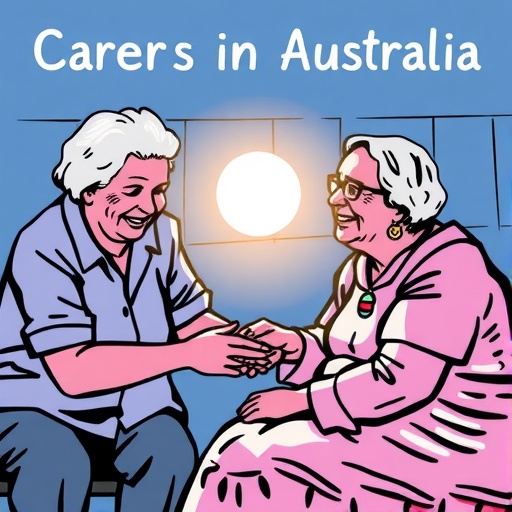In an enlightening study recently published, researchers Iwuagwu, Fernandez, and Poon delve into the intricate world of caregiving within African families in New South Wales, Australia. This research piece titled “More blessing than burden” explores the beliefs, experiences, and cultural significance surrounding the role of family carers as they navigate the challenges of supporting their elderly relatives. The investigation highlights the multifaceted dynamics affecting these caregivers’ emotional and psychological wellness, shedding light on a topic often overlooked in mainstream discussions.
Caregiving is an inherently complex task, particularly when one grapples with the variables of cultural expectations and personal sacrifice. In the context of African families residing abroad, the study reveals that caring for older relatives is deeply intertwined with notions of respect, honor, and familial duties. The researchers argue that these cultural values instill a sense of purpose and connection among caregivers despite the evident challenges they face. This interplay of burden and blessing creates a unique caregiving experience that diverges significantly from Western perspectives on aging and familial responsibility.
The emotional landscape of caregiving is further examined through the lens of personal sacrifice. Respondents in the study articulated that being a carer is not merely a duty but rather a profound calling. The research indicates that while many caregivers may experience elements of exhaustion, stress, and emotional strain, they also derive significant fulfillment from their roles. This paradox highlights a focal point of the study: the endeavor of caregiving can simultaneously manifest as a source of both joy and burden, making it an ambivalent experience overall.
Additionally, the research emphasizes the importance of community and social support networks that African families rely upon. In contrast to the often individualized approach seen in Western societies, African family caregivers draw strength from their communal ties. The shared responsibilities among extended family members and friends play a crucial role in alleviating some of the burdens associated with caregiving. This sense of community not only aids in task sharing but also provides emotional relief and social companionship, which are essential for caregivers’ mental health.
The study also addresses the systemic challenges faced by African family carers in a healthcare environment that may not fully understand their cultural practices or needs. Many caregivers expressed feelings of being marginalized or underrepresented within health care forums. This disconnect can lead to feelings of frustration and helplessness when seeking support or resources, underscoring the necessity for cultural competence in service delivery for these communities.
Another vital aspect explored in this research is the psychological impact of caregiving on mental health. Many caregivers reported experiencing a wide range of emotions—from pride and satisfaction to anxiety and sadness. This leads to a need for psychological support tailored to the unique cultural perspectives of African families. The study advocates for increased mental health resources that take into account the cultural context of caregiving, allowing caregivers not only to receive help but to feel understood and valued in their experiences.
As the study progresses, it offers insights into the coping mechanisms used by caregivers to navigate their demanding roles. Many respondents shared that they engage in traditional practices and spiritual rituals that affirm their cultural identity and provide solace during challenging times. Music, prayer, and connection with their heritage often serve as psychological buffers that enable caregivers to manage stress and maintain emotional balance amid their responsibilities.
Moreover, the narrative of caregiving in the study integrates themes of resilience and adaptability, showcasing how caregivers innovate to meet the needs of their elderly relatives. This creative problem-solving reflects an innate resourcefulness found within these families, embodying both the struggles and triumphs of caregiving. The researchers skillfully interweave personal testimonies that illustrate how caregivers transform obstacles into opportunities, fostering a nurturing environment that emphasizes dignity and respect for aging.
The researchers conclude the study with a call for enhanced awareness and action within the broader community. They argue that understanding the lived experiences of African family caregivers is essential for developing policies and support programs that truly resonate with their needs. By elevating the conversation around cultural perspectives in caregiving, the academic community can pave the way for an inclusive approach that honors the diversity of human experience in elder care.
In summary, the experiences of African family caregivers in New South Wales shed light on the intricate dance between obligation and joy, burden and blessing. This study serves as a crucial contribution to the discourse on aging and caregiving, championing a narrative that appreciates cultural nuances that should inform supportive structures in health care. By bridging the gap between individual experiences and societal understandings, we can foster an environment that truly values the contributions of caregivers and enhances the quality of life for older adults in our communities.
As we reflect on the findings from this pivotal study, it is clear that the journey of caregiving is not just a personal endeavor but a shared narrative that warrants recognition, respect, and support at all levels of society. The insights drawn from this work propel us toward a more compassionate and inclusive geographical and cultural understanding of caregiving, urging stakeholders to advocate for transformative change that empowers both caregivers and their elders.
Subject of Research: African family caregivers’ beliefs and experiences in caregiving.
Article Title: More blessing than burden.
Article References:
Iwuagwu, A.O., Fernandez, E. & Poon, A.W.C. ‘More blessing than burden’ African family carers’ beliefs and experiences caring for their older relatives in New South Wales, Australia.
BMC Nurs 24, 1215 (2025). https://doi.org/10.1186/s12912-025-03884-2
Image Credits: AI Generated
DOI:
Keywords: African family caregivers, elder care, cultural studies, mental health, community support, healthcare challenges.
Tags: African family caregivers in Australiabeliefs about family careblessings of caregiving experienceschallenges of caregiving in New South Walescultural significance of caregivingemotional wellness of caregiversfamilial duties and responsibilitiesintersection of culture and caregivingpersonal sacrifice in caregivingperspectives on aging in African familiesresearch on caregiving dynamicssupport for elderly relatives





